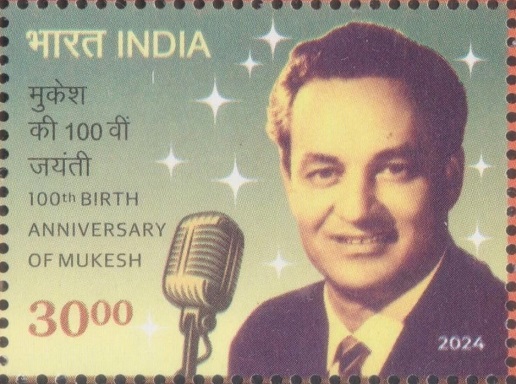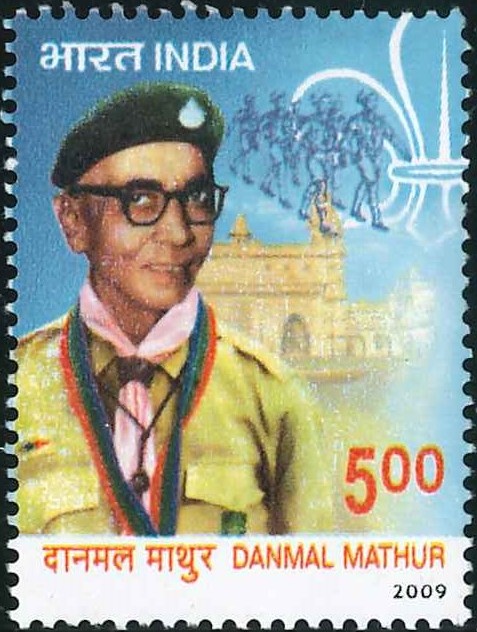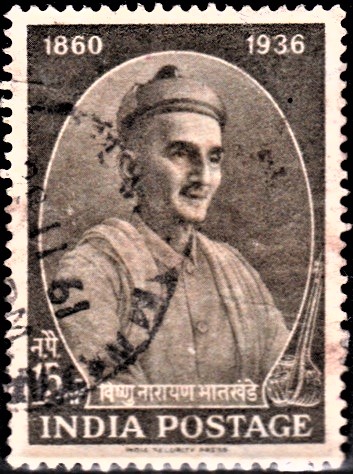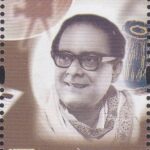
Mukesh 2024
A commemorative postage stamp on 100th Birth Anniversary of Mukesh, voice of the Indian Music :

 Issued by India
Issued by India
Issued on Jul 24, 2024
Issued for : Department of Posts is delighted to release a commemorative postage stamp on Voice of Indian Music Mukesh. With his emotive voice and unforgettable songs, Mukesh’s contribution to music has left an enduring legacy that inspires generations. This commemoration not only celebrates his remarkable talent but also ensures that his influence on Indian music is remembered and cherished for years to come.
Credits :
Stamp/FDC/Brochure/Cancellation Cachet : Sh. Sankha Samanta
Type : Stamp, Mint Condition
Colour : Multi Colour
Denomination : 3000 Paise
Miniature Sheets Printed : 111000
Printing Process : Wet Offset
Printer : Security Printing Press, Hyderabad
Name : Mukesh Chand Mathur
Born on Jul 22, 1923 at Delhi, British India
Died on Aug 27, 1976 at Detroit, Michigan, U.S.A.
About :
- Mukesh Chand Mathur, revered as one of the most iconic playback singers in the history of Indian cinema, etched a lasting legacy through his mellifluous voice and profound emotional expression. Born on July 22, 1923, in Delhi, Mukesh’s journey from modest beginnings to musical greatness is a tale of talent, perseverance, and enduring impact.
- Mukesh’s early life was marked by humble circumstances, where he initially worked as a peon in the Central Public Works Department. During this time, fate intervened, and the renowned actor Motilal discovered his exceptional vocal ability. Recognizing Mukesh’s potential, Motilal encouraged him to pursue a career in playback singing, thus setting the stage for his remarkable ascent in the world of music.
- Arriving in Bombay (now Mumbai) in the 1940s, Mukesh embarked on his professional singing career, honing his craft with unwavering determination. His debut in playback singing quickly garnered attention, as his voice possessed a unique blend of depth, clarity, and emotive power that resonated deeply with listeners. Collaborations with eminent composers like Naushad, Anil Biswas, and Ghulam Haider further showcased Mukesh’s versatility and ability to interpret diverse musical styles with finesse.
- Mukesh’s breakthrough came with the film “Pehli Nazar” (1945), where his rendition of the song “Dil Jalta Hai To Jalne De” captivated audiences and established him as a formidable presence in the realm of Hindi film music. Throughout the 1940s and 1950s, Mukesh continued to deliver a string of memorable hits, including the hauntingly poignant “Awara Hoon” from the film “Awara” (1951) and the soul-stirring “Jeena Yahan Marna Yahan” from “Mera Naam Joker” (1970), which showcased his ability to convey deep emotions through his singing.
- One of Mukesh’s defining qualities was his ability to evoke a range of emotions—from joy and romance to melancholy and introspection—through his vocal performances. His voice became synonymous with the golden era of Bollywood music, resonating with audiences across India and beyond. Songs like “Mera Joota Hai Japani” from “Shree 420” (1955) and “Main Pal Do Pal Ka Shayar Hoon” from “Kabhi Kabhie” (1976) exemplify his mastery in capturing the essence of each lyric and melody, elevating them to the status of timeless classics.
- Beyond Hindi cinema, Mukesh’s influence extended to regional languages, where he lent his enchanting voice to songs in Gujarati, Marathi, Bengali, Rajasthani, Punjabi, and even Sanskrit. His ability to transcend linguistic barriers endeared him to audiences across India, solidifying his reputation as a pan-Indian icon of musical excellence. In recognition of his exceptional contributions to Indian music, Mukesh received numerous accolades during his career. He was honored with several Filmfare Awards for Best Playback Singer, including posthumous recognition for his poignant rendition in “Kabhi Kabhie”. Additionally, Mukesh was bestowed with the prestigious National Film Award for Best Male Playback Singer for his soulful rendition of “Kai Baar Yun Bhi Dekha Hai” from the film “Rajnigandha” (1974), underscoring his versatility and enduring appeal.
- Despite his towering success in the world of music, Mukesh remained grounded and committed to philanthropic causes. He actively participated in social initiatives and was a devoted member of Rotary International, using his talent to entertain and uplift communities during times of national crisis.
- Tragically, Mukesh’s life was cut short on August 27, 1976, when he passed away suddenly during a concert tour in the United States. His untimely demise left a profound void in the hearts of music lovers worldwide, marking a somber moment in Indian music history. Yet, Mukesh’s legacy endures through his timeless melodies, which continue to captivate new generations and evoke deep emotional resonance.
- Mukesh Chand Mathur’s journey from a humble beginning to becoming an iconic figure in Indian playback singing exemplifies the transformative power of music. His ability to touch hearts and convey profound emotions through his soulful voice remains unparalleled, making him a timeless beacon of artistic excellence. Mukesh’s contributions to Hindi cinema and Indian music as a whole are not just a chapter in history but a testament to the enduring impact of his talent and dedication. As long as there are melodies that stir the soul and songs that resonate with emotion, Mukesh’s voice will echo through the corridors of time, reminding us of the enduring power of music to transcend boundaries and enrich human experience.
- Text : Based on information received from Ministry of Culture.







